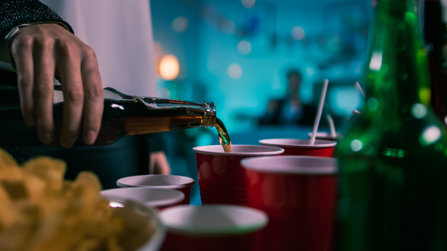Going Back to College While in Recovery

But college has some downsides, too. Excessive alcohol consumption can sometimes be a problem among college students, as can be partying, peer pressure, and even drug use. Not everyone in college does these things, but some do.
How can a recovering addict navigate the college experience, get the most out of it as possible, and avoid relapse?
What Challenges Might a Recovering Addict Face in a College Environment?
While recovering addicts are encouraged to rejoin the workforce, go back to school, be a stay-at-home parent, or dive into whatever worthwhile and responsible activities they are interested in, doing so can present unique challenges. The key is, though, that a recovering addict must confront these challenges, succeed, move past them, and continue to create success and forward progress in life.
For recovering addicts who want to go to college, what are some of the unique struggles they might face?
- Academic demand. There is no doubt that college courses put a fair amount of demand on students. And depending on the subjects one is studying, how many classes they are taking, and how well they apply themselves to the task, this stress factor can be significant. If a recovering addict is not prepared for the shear strain of his or her course load when the semester begins, that could cause a fair amount of stress and struggle, potentially pushing one towards a relapse.
- Party environments. While colleges are higher learning institutions and certainly do operate as moral, principled institutions, there’s no doubt that a fair amount of partying occurs at college. Much of this partying is social and involves a fair amount of drinking. If a recovering addict finds himself at such an event, the temptation to drink could cause a relapse.
- Peer Pressure. Peer pressure is another factor to consider. Excessive alcohol consumption is a factor at college parties, but the peer pressure to drink at such parties can be significant.
- Lack of a support group. While a few colleges have collegiate support groups for recovering addicts (more on that later), a recovering individual may find it challenging to find support for their recovery while on campus. And without a support group, a recovering addict does not have like-minded individuals to turn to when times get tough.
A Look at the Statistics—The Risk is Real

There exists some statistical data that shows that alcohol consumption is more prevalent among college students. According to the National Institute on Alcohol Abuse and Alcoholism:
- The prevalence of alcohol consumption among college students is concerning. According to a 2018 report, 55 percent of college students (aged 18 to 22) drank alcohol at least once in the month leading up to the survey, compared to 45 percent of non-college students of the same age.
- The prevalence of binge drinking (drinking to the point of a 0.08 BAC level) among college students is also alarming. About 37 percent of college students report binge drinking at least once in the past month, compared to 28 percent of young adults in the same age bracket but who are not in college.
- Heavy alcohol use (binge drinking at least five times in a month) is a severe concern on many college campuses. About 10 percent of college students engage in heavy alcohol use, compared to 7 percent of 18 to 22-year-olds who are not in college.
- Alcohol use among college students is also incredibly harmful. For example, about 1,825 college students die from alcohol-related, unintentional injuries every year (such as drunk driving accidents). Each year about 696,000 students are assaulted by a student who had been drinking. About 97,000 alcohol-related sexual assaults (including date-rape) occur among college students each year. About twenty percent of college students meet the criteria for alcohol addiction. About one in four students admit that they suffer adverse academic consequences from drinking, such as failing exams, missing classes, etc.
Collegiate Recovery Support Programs
As we can see from the statistics above, alcohol consumption is somewhat prevalent on many college campuses. That would pose a risk for a recovering addict, even if alcohol had not been that individual’s drug of choice. Remember, a recovering addict must stay away from all mind-altering substances.
A thankfully growing trend in the United States has been one of collegiate recovery support programs. These are usually student-organized groups where college students who are in recovery from drug or alcohol addiction come together in solidarity to work on the challenges of navigating college life without being pulled into alcohol abuse. Thankfully, collegiate recovery support programs are beginning to catch on, with some colleges even changing their policies on drinking and partying due to pressure from such recovery groups.
Addiction Treatment—Where to Go Should a Relapse Occur
A recovering addict’s goal should be to navigate the challenges of life on campus without relapsing on drugs or alcohol. And in the absence of an on-campus support group, it may behoove the recovering addict to seek help off-campus, spend more time with their family members, loved ones, and other pro-recovery supporters, etc. This might be a great time to dive even deeper into one’s recovery, study books on recovery success, and help others get off drugs.
When one enters college as a recovering addict, there’s a chance that the risk for relapse may go up. So, if the risk goes up, they should in turn up the ante on things they are doing to help bolster and further stabilize their recovery.
If worse comes to worst and the recovering addict relapses, the solution is for him or her to seek help at a drug and alcohol treatment center. That must happen immediately. A relapse back onto drug use or drinking means that there are still some powerful compulsions to drink and use drugs. It means that the individual should seek help as soon as possible to address these stubborn compulsions.
If you know someone in recovery who relapsed, be sure they get into a drug rehab center as soon as possible. Relapses are extremely dangerous because it is far too easy to take too much of a substance and overdose (as a recovering addict’s body won’t be used to drugs and alcohol after a period of sobriety). Please don’t wait until it is too late. Get your loved one help today.
Sources:
- https://www.niaaa.nih.gov/publications/brochures-and-fact-sheets/alcohol-facts-and-statistics
- https://www.ncbi.nlm.nih.gov/pmc/articles/PMC4852860/
- https://counseling.northwestern.edu/blog/college-substance-use-recovery-ally/
- https://www.nbcnews.com/news/us-news/growing-number-sober-programs-support-college-students-recovering-addiction-n875326
- https://www.ncbi.nlm.nih.gov/pmc/articles/PMC3134882/
